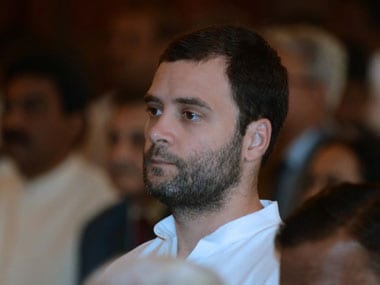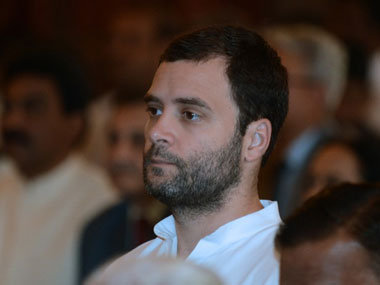Rahul Gandhi has perhaps never cared to know the history of the Congress party, or the actions of previous generations of his family with respect to government formation in the states. The Congress in the past has blocked rival parties from forming governments, thrown elected governments out of power and — if no other option worked — dissolved Assemblies. Had the Congress president read about his own party’s history, he would not have made the two statements that he did (one on Twitter and another at a public rally.) On Twitter, Rahul Gandhi said —
The BJP’s irrational insistence that it will form a Govt. in Karnataka, even though it clearly doesn’t have the numbers, is to make a mockery of our Constitution.
— Rahul Gandhi (@RahulGandhi) May 17, 2018
This morning, while the BJP celebrates its hollow victory, India will mourn the defeat of democracy.
In his second statement, at a rally in Raipur to launch his party’s campaign in Chhattisgarh, Rahul took his anger to another level. He compared the state of the Indian judiciary with Pakistan. He was quoted as saying in IANS, “Usually people go to the Supreme Court for justice. But for the first time in 70 years, we saw Supreme Court judges coming to the people complaining that they are being intimidated and they are not being allowed to do their job. It happened in Pakistan and Africa. But this happened for the first time in 70 years in India.” Let us first take the Congress president’s “mockery of the Constitution” comment. If he looks into history, he will find some outrageous instances of mockery of the Constitution. Way back in 1957, the Communist Party of India won the Assembly elections in Kerala and EMS Namboodripad became the chief minister. However, the first communist elected government could last only for two years. Jawaharlal Nehru, the then prime minister, using the ruse of ‘breakdown of constitutional machinery’ in the state, threw the Namboodripad government out, imposed President’s rule in the state for a while and then dissolved the state Assembly. During Indira Gandhi’s reign at the Centre in 1982, Haryana Governor GD Tapase set a new low in terms of constitutional impropriety. He prevented Devi Lal (supported by the BJP) from being sworn in and foisted Bhajan Lal of the Congress as the chief minister. Bhajan Lal was sworn in without following any protocol, an act by the Governor which angered Devi Lal so much that he couldn’t restrain himself from manhandling Tapase. [caption id=“attachment_4473649” align=“alignleft” width=“380”]  File image of Congress president Rahul Gandhi. AFP[/caption] On several instances, Indira Gandhi disregarded constitutional propriety while removing chief ministers of states ruled by Opposition parties. She had also misused Article 356 of the Constitution for the imposition of President’s rule and engineered defections both at the Centre and the states. Governors like Ramlal during Indira’s reign make for a case study on how constitutional norms could be thrown to the winds to satisfy personal whims of the political boss at the Centre. In August 1984, Ramlal summarily dismissed the first non-Congress government in Andhra Pradesh led by NT Rama Rao, even though the latter had an absolute majority in the Assembly. Although Nadendla Bhaskara Rao was sworn in as the chief minister, a resilient NTR forced Indira to reverse her decision and allow the reinstatement of the Telugu Desam Party leader at the helm. The imposition of the Emergency, of course, was the darkest hour of Indian democracy. Romesh Bhandari, the governor of Uttar Pradesh in the late 1990s, also did not care for constitutional propriety. He dismissed Kalyan Singh’s government at night and immediately administered the oath of the chief minister’s office to Jagdambika Pal (a man who led a hopeless minority). The high court severely indicted Bhandari and for the first time, a composite floor test took place in the Assembly on the orders of the court. Kalyan Singh won that composite floor test and became the chief minister again. Pal was the chief minister for only a day and his name does not figure in the list of chief ministers in Uttar Pradesh, as per directions of the court. Similar examples existed during the Manmohan Singh-led government, which was effectively controlled by Sonia Gandhi. Governors like Syed Sibte Razi in Jharkhand and Buta Singh in Bihar contravened all constitutional, ethical and moral norms to prevent the BJP, or a coalition of which BJP was a part, to come to power. In both the cases, the Supreme Court severely indicted the governor’s role. In Bihar, the Manmohan Singh government also came in for severe embarrassment after the Union Cabinet recommended the dissolution of the Assembly. (The then President APJ Abdul Kalam was made to sign the notification and fax it from Moscow) As for Rahul’s “Pakistan” analogy, it would suffice to say that post-midnight hearings have happened twice in recent times. The first one was to prevent the hanging of terrorist Yakub Memon on 30 July, 2015. At that time, a three-judge bench had heard the matter at 3 in the morning. The second one was on 17 May, 2018, when a three-judge bench heard a petition seeking to prevent the BJP’s BS Yeddyurappa from being sworn in as chief minister of Karnataka. The Congress president should realise that this does not happen in Pakistan.


)
)
)
)
)
)
)
)
)



